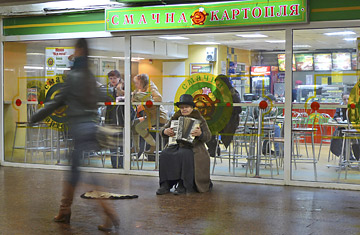
A elderly Ukrainian woman plays the bayan to earn some money in Kiev's subway
Every morning Alexander Vesna, 63, makes the same journey to his bank in the center of Kiev. He stands in line for five or six hours before he is allowed to take out a maximum of 300 hryvnia ($35). "It's my money," he says. "But they won't let me have it."
He is not alone in his frustration. In the past two weeks tens of thousands of Ukrainians have descended upon banks across Kiev, anxious to get hold of their cash. With a number of banks already under the administration of the National Bank, worried citizens have drained over 20% of hryvnia deposits since November. As banks struggle to come up with enough cash to meet demand, one has even proposed a scheme of exchanging deposits for homes that have been repossessed. "I have to come here every day to stand in line in the cold, with no food or toilet," Vesna says. "But what else can I do?" (See pictures of Ukraine's neighbors, Russia.)
Ukraine has been hit harder than most by the financial crisis. The metal and chemical industries that drive the country's economy have slashed production, unemployment is on the rise — according to the Kiev International Institute of Sociology (KIIS), over 10% of Ukrainians have lost their jobs since the start of the crisis — and the hryvnia has plummeted, shedding over a third of its value against the dollar since last summer.
And banks are not the only places where people are showing their discontent. "Everyone out!" read signs on the dozen or so tents in Independence Square, the site of the Orange Revolution protests in 2004 that signaled a democratic breakthrough in Ukraine. Disillusionment with the leaders that revolution brought to power, President Viktor Yushchenko and Prime Minister Yulia Tymoshenko, runs high. Yushchenko's approval ratings have plunged to below 5% on the back of his failure to make good on his promises to bring an end to government corruption and send "bandits to jail."
"I think everyone in the country is disappointed with what has happened, especially the one million who stood on this square," says Roksolana (who declined to give her last name), one of the around 20 protesters who have set up camp there. "We are against everyone in power. We want transparent authorities who don't steal and an end to corruption. We'll stay as long as it takes."
In recent weeks, a variety of groups have come out in protest, from truckers to small business owners. The largest was a crowd of 10,000 demonstrating against the Kiev city council's handling of the financial crisis, which has pushed the mayor to propose novel ways of filling the city's coffers, such as charging entrance fees to cemeteries. And this is only the beginning: A recent KIIS survey revealed that 41% of Ukrainians are ready to hit the streets. "There is a crisis of trust in the authorities," says Volodymyr Fesenko, director of the Penta Center for Applied Political Studies in Kiev. "There is a risk of a chain reaction leading to what happened in Riga," he adds, referring to when angry Latvians, protesting their government's handling of the crisis, tried to storm parliament in January.
Much of the anger is directed at the president and the prime minister, whose bickering is hampering efforts to overcome the crisis. "An economic crisis demands political stability," Fesenko says. "But the destabilizing factor at the moment is next year's presidential elections," in which both Yushchenko and Tymoshenko are expected to vie for the top spot.
Tymoshenko has claimed that the unpopular Yushchenko is trying to push the country toward default in order to declare an emergency situation so that he can remain president. For his part, Yushchenko has accused Tymoshenko of betraying national interests and agreeing "a secret Molotov-Ribbentrop protocol" with Moscow as part of attempts to secure a $5 billion loan to cover budget shortfalls. Russia's outspoken ambassador to Ukraine, former Prime Minister Viktor Chernomyrdin, caused a diplomatic uproar in February when he said they were "at each other like dogs."
The infighting led the finance minister to resign last month, complaining that he had become "a hostage to politics." The lack of unity on the budget also led the International Monetary Fund (IMF) to delay disbursement of the second installment of a $16.4 billion loan, sorely needed to shore up banks and the wobbling currency.
But things may not be as bad as they seem. Banking analysts suggest that talk of a sovereign default is overblown, and say not all banks are struggling to pay out. Even more promisingly, Yushchenko and Tymoshenko announced a truce at the end of last week and sent a revised anti-crisis plan to the IMF in the hope of securing further funds.
Whether this truce will last, however, is anyone's guess. In a sign that it could be over already, the headquarters of the state-owned energy company Naftogaz, which answers to Tymoshenko, were raided on Wednesday by armed agents from the state security service, the SBU, which is controlled by Yushchenko. The SBU says it is investigating Naftogaz for "misappropriating" gas that belongs to private energy company RosUkrEnergy; Tymoshenko says the SBU is being used by a "corrupt group" in a fight for gas she says belongs to Ukraine. "There's no such thing as a truce between cats and dogs," says Mykola Stasyuk, 53, as he waits in yet another bank line.
